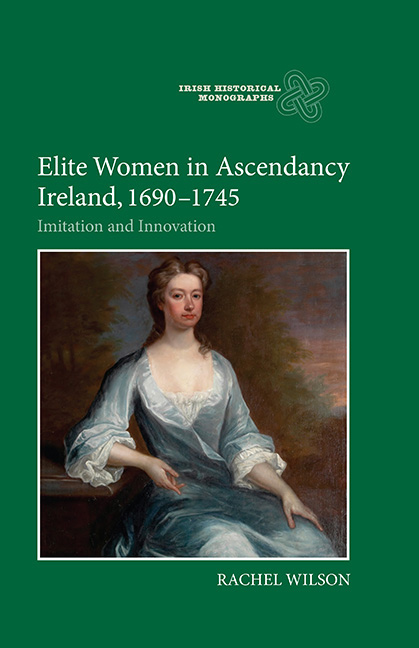Book contents
- Frontmatter
- Dedication
- Contents
- Acknowledgements
- Abbreviations
- A Note on the Presentation of Material in the Text
- Introduction
- 1 The Making and Breaking of a Marriage
- 2 Mothers and Children
- 3 The lady of the house
- 4 Widows, Guardians and Estate Managers
- 5 Society Queens
- 6 Political Players
- 7 Institutional philanthropy
- Conclusion
- Appendices: Family Trees
- Bibliography
- Index
- Frontmatter
- Dedication
- Contents
- Acknowledgements
- Abbreviations
- A Note on the Presentation of Material in the Text
- Introduction
- 1 The Making and Breaking of a Marriage
- 2 Mothers and Children
- 3 The lady of the house
- 4 Widows, Guardians and Estate Managers
- 5 Society Queens
- 6 Political Players
- 7 Institutional philanthropy
- Conclusion
- Appendices: Family Trees
- Bibliography
- Index
Summary
Writing from her home in Holymount, County Down, in 1745, Mary Delany, wife of the dean of Down, expressed her concern to her sister over the state of the household of their brother, Bernard Granville:
I find his domestics [meaning servants] are not right yet, nor can they ever be in good order till he has a wife to manage them, for men are no judges of domestic affairs; we were designed for that purpose, and have the talents that are fit for the purpose.
There were few areas outside of childbirth in which a woman could have made such a sweeping generalisation as to the superiority of her own sex over the other without risking a serious backlash, but household management was one of them. There was no question in Mary's mind that a wife, any wife, would be preferable to Bernard's singleton status. All of his household problems were caused by his bachelorhood and all would be solved by his marriage, for domestic dominance was a task for which women were born, educated and uniquely fitted, having been granted greater abilities to any man by the Almighty himself. Even ladies of the elite, the social group of which Mary considered herself, her brother and any potential sister-in-law, members, were not exempt.
Though such ideas went against the general consensus that male trumped female, Mary's belief that her brother was handicapped by his gender in a way in which a wife would not be, were typical for one of her station and time and across her native England and adopted Ireland, conduct writers and the men and women of both elites echoed her views. Just five years earlier, Wetenhall Wilkes in his Letter of genteel and moral advice to a young lady published in Dublin, dictated that ‘oeconomy, or the art of house-keeping, is the most immediate female business’ and one from which ‘neither wealth nor greatness can totally absolve you’. His ideas were not new, for George Savile, marquis of Halifax, had advised his daughter Elizabeth in 1688, that household management was ‘the province allotted to your sex’.
- Type
- Chapter
- Information
- Elite Women in Ascendancy Ireland, 1690-1745Imitation and Innovation, pp. 57 - 77Publisher: Boydell & BrewerPrint publication year: 2015



